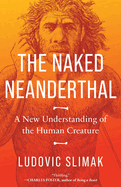
Paleoanthropologist Ludovic Slimak, author of hundreds of peer-reviewed scientific articles, argues in The Naked Neanderthal for an understanding of Neanderthals as neither primitive beasts nor fully human--but something distinctive and worth the effort to look past our prejudices to understand. The brilliance in Slimak's book, his first for a popular audience, is in how he lays out his view, moving seamlessly between narrative, summaries of past research, and argument.
Each chapter is organized around intriguing topics that allow Slimak to provide a wealth of context. For example, discussion of an archeological theory about Neanderthal cannibalism includes forays into sociological, anthropological, and psychological perspectives on cannibalism; environmental and social factors in eras of famine; and death rituals, leading to a conclusion that historians cannot reach full understanding without additional context. As with the book as a whole, this discussion begins with clear-cut questions and ends with even more--and more exciting--questions to ponder. By the last pages of the book, readers cannot help but see Slimak's point in ascribing our need to define Neanderthals as "us" or "not us" to the very same drives perpetuating racism.
This book is not merely a history of Neanderthals; it is also a history of the field of archeology. Slimak draws readers in with a journey mirroring the excitement, frustration, titillation, and doubt that characterizes study of the deep past, and he leaves them with food for thought about where we come from, who we are, and who we want to be. --Dainy Bernstein, postdoc in children's literature, University of Illinois Urbana-Champaign

